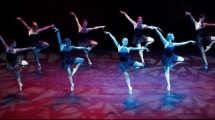Abstract
Being on of the youngest field of human endeavours, software development absorbed features of other, older fields, especially engineering, mathematics, and economics. However, being software the product of the creation and being based on a systematic discipline and technical excellence of the participants (the developers), there could be also very interesting interconnections with artistic disciplines. In this paper, we concentrate on the similarities with dance. Dance has a long tradition of instructions and development. The goal of this work is to find interesting points of contact is to identify dancesport methods that could provide the basis for new approaches or practices for software development.
Access this chapter
Tax calculation will be finalised at checkout
Purchases are for personal use only
Similar content being viewed by others
References
The meeting of software engineering and dancing, January 2012
Glowing Coding and Choreography (2013). Accessed 27 June 2018
Agile dancing. scrum training. is it even possible?, December 2017. Accessed 28 June 2018
Auslander, P.: Liveness: Performance in a mediatized culture (2008)
Boyle, M.S.: Play with authority!: radical performance and performative irony. In: Cultural Activism, pp. 199–217 (2011)
Christopher Alexander, M.S., Ishikawa, S.: A pattern language (1977)
Cockburn, D.A.: Heart of agile
Coman, I.D., Sillitti, A., Succi, G.: Investigating the usefulness of pair-programming in a mature agile team. In: Abrahamsson, P., Baskerville, R., Conboy, K., Fitzgerald, B., Morgan, L., Wang, X. (eds.) XP 2008. LNBIP, vol. 9, pp. 127–136. Springer, Heidelberg (2008). https://doi.org/10.1007/978-3-540-68255-4_13
Corral, L., Georgiev, A.B., Sillitti, A., Succi, G.: A method for characterizing energy consumption in Android smartphones. In: 2nd International Workshop on Green and Sustainable Software (GREENS 2013), pp. 38–45. IEEE, May 2013
Daily, S.B., Leonard, A.E., Jörg, S., Babu, S., Gundersen, K., Parmar, D.: Embodying computational thinking: initial design of an emerging technological learning tool. Technol. Knowl. Learn. 20(1), 79–84 (2014)
Di Bella, E., Sillitti, A., Succi, G.: A multivariate classification of open source developers. Inf. Sci. 221, 72–83 (2013)
Dillon, L.K., Dobbins, A., Owen, C., Evjen, M., Kanouse, D., Sallak, W., Willcuts, B.: Dancing computer (2015). Accessed 28 Oct 2018
Fauconnier, G., Turner, M.: The way we think: Conceptual blending and the mind’s hidden complexities, May 2003. Accessed 28 June 2018
Fronza, I., Sillitti, A., Succi, G.: An interpretation of the results of the analysis of pair programming during novices integration in a team. In: Proceedings of the 2009 3rd International Symposium on Empirical Software Engineering and Measurement, ESEM 2009, pp. 225–235. IEEE Computer Society (2009)
Janes, A., Succi, G.: Lean Software Development in Action. Springer, Heidelberg (2014). https://doi.org/10.1007/978-3-642-00503-9
Laurel, B.: Computers as theatre, September 2014
Lee, C.: Learning to code is just like learning to dance, May 2018. Accessed 28 Oct 2018
Mashiko, Y., Basili, V.R.: Using the GQM paradigm to investigate influential factors for software process improvement. J. Syst. Softw. 36(1), 17–32 (1997)
Maurer, F., Succi, G., Holz, H., Kötting, B., Goldmann, S., Dellen, B.: Software process support over the internet. In: Proceedings of the 21st International Conference on Software Engineering, ICSE 1999, pp. 642–645. ACM, May 1999
Sedgwick, E.K., Parker, A.: Performativity and Performance. Routledge, London (2013)
Ravipati, S.: Students learn computer programming skills through dance, February 2016
Rosner, F.: Explain agile like i’m a sports student (2018)
Rubin, K.S.: Essential scrum: A practical guide to the most popular agile process (2012). Accessed 27 June 2018
Sillitti, A., Janes, A., Succi, G., Vernazza, T.: Measures for mobile users: an architecture. J. Syst. Architect. 50(7), 393–405 (2004)
Acknowledgments
We thank Innopolis University for generously funding this research.
Author information
Authors and Affiliations
Corresponding authors
Editor information
Editors and Affiliations
Rights and permissions
Copyright information
© 2020 Springer Nature Switzerland AG
About this paper
Cite this paper
Erofeeva, I., Ivanov, V., Masyagin, S., Succi, G. (2020). Learning Agility from Dancers – Experience and Lesson Learnt. In: Bruel, JM., Mazzara, M., Meyer, B. (eds) Software Engineering Aspects of Continuous Development and New Paradigms of Software Production and Deployment. DEVOPS 2019. Lecture Notes in Computer Science(), vol 12055. Springer, Cham. https://doi.org/10.1007/978-3-030-39306-9_8
Download citation
DOI: https://doi.org/10.1007/978-3-030-39306-9_8
Published:
Publisher Name: Springer, Cham
Print ISBN: 978-3-030-39305-2
Online ISBN: 978-3-030-39306-9
eBook Packages: Computer ScienceComputer Science (R0)




